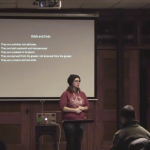This is the second of two articles about Spiritual Disciplines. If you haven’t had the chance to read the first article, you can read it HERE.
Each discipline is written by a different author, all attendees of Hope.
What is Worship?
According to Merriam-Webster, worship is defined as “the feeling or expression of reverence and adoration for a deity.” As a follower of Christ, I’d define it as an expression of praise and gratitude to the one who is above all things, our sovereign Lord and heavenly Father.
How do I incorporate the discipline of worship into my life?
Worshiping God through working with my hands is an expression of what it means to be made in His image. I love working with my hands but that was not always true. I was the artist, good at drawing from an early age, in a family of engineers who love cars. When we bought our first home my mind wandered often to various DIY projects and I’ve since learned that problem-solving with positive results really energizes me. It’s fun to step back from a creation, take it all in, and say, “It is good.”
“The Creator” is a term for God the Father that many, inside the church and out, feel safe to use. And while this is one of many terms to describe our omnipotent, omni-present and all-loving sovereign ruler of the universe (I went a little John Piper there), I wonder if the safe version of the term “The Creator” could use some further examination?
In Genesis 2:7 we see God’s intimacy with His image-bearers.
“…then the Lord God formed the man of dust from the ground and breathed into his nostrils the breath of life, and the man became a living creature. And the Lord God planted a garden in Eden, in the east, and there he put the man whom he had formed.”
God’s hands get dirty raising Adam up from the dirt and He breathes life into the first man and then God plants a garden for him to enjoy. In creating the first woman, Eve, the intimacy imagery in Genesis 2:20-22 reads like the hands of a skilled surgeon.
“The man gave names to all livestock and to the birds of the heavens and to every beast of the field. But for Adam there was not found a helper (in Hebrew, the same word is used to describe The Creator God) fit for him. So the Lord God caused a deep sleep to fall upon the man, and while he slept took one of his ribs and closed up its place with flesh. And the rib that the Lord God had taken from the man he made into a woman and brought her to the man.”
In other creation stories the gods create humans out of a great battle or an animal and, in most cases, humans do the work the gods don’t want to do anymore. Humans were not the only thing God created but when he finished with His image-bearers He said it was not just good, but VERY good.
Throughout all of scripture God’s intimacy with his creation is foremost and in Revelation 21:4 we are told that we will return to the close and personal contact we had in the Garden of Eden.
“He will wipe away every tear from their eyes, and death shall be no more, neither shall there be mourning, nor crying, nor pain anymore, for the former things have passed away.”
So how does all of this relate to my love for DIY, woodworking and most anything that can be fixed, upgraded or created from new with your hands? We bear the image of God, the one who created intimately with His hands in the dirt or like a surgeon and the same one who will use His hands to wipe away our tears in the eternal future.
You might not think you can create with your hands or you lack the confidence. Take it from me, you can take the baby steps, grow in confidence, try, fail and try again. And through it you might gain a small understanding of God himself when you step back from your creation and say, “It is good.”
Author: Mark Hintz
What is Evangelism?
The discipline of evangelism is a specific subset of the Christian walk focused on sharing the message of the gospel to the world. Evangelism comes from the Greek word evangelion, meaning the gospel or good news. So, the word evangelism breaks down to be “gospel-ing” or “good news-ing” to others. To evangelize is to call others to action concerning the gospel of Jesus. This calling comes in many modern forms (like verbal communication, writing on a whiteboard, or typing an iMessage) whose common denominator is a call to faith in Christ as Lord and Savior. God chose to communicate salvation’s plan through the life of Jesus, and similarly seeks to communicate the same plan through us, His Church.
How do I incorporate evangelism into my life?
I find that evangelism in my life begins by believing the truth of the gospel for myself. The fun with evangelism is seeing the forms that proclaiming Christ takes! Like the Apostle Paul sprung from the clink by an earthquake, opportunities to share the gospel come in any way God presents. From random conversations at a cafe to leisure time with life-long friends, spreading the good news with others is the result of believing the true gospel first and foremost. Evangelism brings me deep joy and brings me closer to God.
Author: Jake Smith
What is Fasting?
Fasting is a spiritual discipline that we are called to practice by Jesus (Matthew 6:16) For fasting to be Biblical, it must be spiritually motivated, whether for strengthening prayer, humbling oneself, grieving, or overcoming temptation, just to name a few motivations. Throughout Scripture, it’s critical to note that fasting goes hand in hand with prayer (Ezra 8:23, Nehemiah 1:4, Luke 2:37). So what does fasting entail beyond simply not eating? John Piper says, “The heart of it is longing. We are putting our stomach where our heart is to give added intensity and expressiveness to our ache for Jesus. We fast to express our longing or our ache for all the implications of Jesus’s power in the present moment that isn’t completely realized.” (1)
How do I incorporate the discipline of fasting into my life?
Growing up a believer in an Evangelical church, I do not recall learning about fasting and actually applying it in my life. To be completely honest, I never had a conviction about fasting until a close friend was in a period of intense suffering and needed prayer for an upcoming difficult conversation. A few other believers and I felt fasting and praying for one day was a tangible way to be unified in supporting her. We fasted and prayed for spiritual strength, protection, and deliverance, so she didn’t feel alone in her weariness and that the Lord would sustain her.
In each moment of emptiness I feel while fasting, it reminds me to pray for dependence on God and earnestly seek his will in whatever circumstance I or someone else may be facing. It doesn’t guarantee an answer or our desires to be fulfilled, but it does open our hearts and minds to what God has to say to us if we allow. I’m by no means a regular at this spiritual discipline, and writing this brief itself has reminded me of why Jesus calls us to fast. Even though he doesn’t tell us how long or how often, Donald S. Whitney says “fasting is not to be a legalistic routine. It is a privilege and an opportunity to seek God’s grace that is open to us as often as we desire.” (2)
Notes / Resources:
(1) A Hunger for God by John Piper (Free download on desiringgod.org)
(2) Spiritual Disciplines for the Christian Life by Donald S. Whitney
(3) What is the Purpose of Fasting? by John Piper
Author: Emily Hunt
What is Silence/Solitude?
Silence/Solitude is the practice of quiet, intentional alone time with God.
How do I Incorporate the discipline of Silence/Solitude into my life?
Silence and Solitude can be an easier discipline to approach because many people find deep, personal meaning in practicing it even once. Start by setting aside some time for a half hour to sit with God, in silence, and then see what happens! And then do it again. More helpful tips and ideas are in the Silence and Solitude article.
Author: Jordan Anderson
What is Sabbath?
Sabbath is holy. The definition of holy is to be set apart, sacred, separate, and morally excellent. This day should be different than the other six days of the week. We know that we are made in the image of God, and we see in Genesis that God Himself rested on the seventh day. When He calls us to rest on the seventh day as well and to keep it holy, He is not just giving us a day off of work; He’s commanding us to be like Him. God rested – we should rest. He is Holy – we should be holy.
How do I Incorporate the discipline of Sabbath into my life?
For more about how Shannon and her family incorporated Sabbath into their life click here.
What is Journaling?
Journaling will look different for everyone, but at the heart of it is a desire to connect and grow closer with God. It is a way to see God’s hand in our life, whether it is seeing prayers answered, finding truth in God’s word, or admiring all the ways God has blessed us. As a spiritual discipline, it is something that should be practiced and through our commitment to it we can grow closer to God. .
How do I Incorporate the discipline of journaling into my life?
I have found that when I sit down to spend time with God it can be hard for me to focus and slow down. At times, I feel like I am battling the random thoughts that keep popping into my head or I am distracted by the ever growing list of things to do and remember. All of these distractions can make my prayer and quiet time tough and it often keeps me from feeling close to God. With a desire to be more present with God, I found that journaling is a great tool for me. Journaling has allowed me to reign in my thoughts and intentionally focus on God. As I start to write my mind begins to shift to seeing my thoughts through a more Christ-centered lens. Journaling is a way of directing my thoughts and my prayers to God through writing. It can also be a way for me to delve into scripture and think more deeply about God’s word.
When I first started journaling, I simply wrote out my prayers. I found that it was easier for me to focus during my prayer time as I thought intentionally about each word I wrote. As I dove deeper into these thoughts, the constant nagging from the outside world would slowly slip away. I felt like I was entering into a space with God where I could share and navigate my thoughts and feelings.Wanting to add more depth to my journaling and desiring an even deeper connection with God, I found that my journal was lacking in some areas. Using the acronym ACTS, adoration, confession, thanksgiving, and supplication, I started using a structure that helped me be able to see which areas of my prayers I could grow in. I don’t always stick to this structure, but I still find it a good way to check in on my prayers.
It took me a long time to fill up my first journal, but when I was done I decided to look through my prayers. I was amazed at what I saw. I was able to clearly see the ways in which God was working in my life. I could see first hand how God was answering prayers and providing for me. Being able to see God’s hand in my life so clearly encouraged and motivated me to commit more fully to this spiritual discipline.
As I continued to journal daily and read scripture, I realized that I was still having a hard time soaking in God’s word. Knowing that journaling helped me focus more fully on my prayer, I wondered if writing out scripture would have a similar positive effect. I started looking for a verse or two that stuck out to me and I would copy that verse into my journal. As I wrote the words, I would meditate on why those words stuck out to me and what I could learn about God through his word. More recently I was reminded in Pastor Drew’s sermon of one of Tim Keller’s outline for looking at scripture, which includes spending time looking at what we can admire, admit, and aspire to in regards to a specific passage. Adding scripture to my time journaling allowed me to delve even deeper into God’s word.
Journaling can be a time to reflect on your own life and thoughts, but it should also be a time to pray for others. I found that taking my journal to my small groups accountability time was a way for me to remember the prayer requests of others. I could then use these notes to pray for others throughout the week. It made it easy to help hold each other accountable and was a way to see how God was working and answering prayers in other people’s lives too. As I journaled these prayers, I would sometimes share these words with each individual. These words have a more powerful way of encouraging other than simply saying I’ll pray for you.
In tougher seasons, I have seen my journal fill up with prayers for healing and help, and my praises for God slowly disappear. In reading Ann Voskamp’s book, One Thousand Gifts, I was challenged to write out my gratitudes. As I filled my journal with things I was thankful for, it became easier to praise God and give him credit for all the joys in my life.
Author: Celeste Stimack



